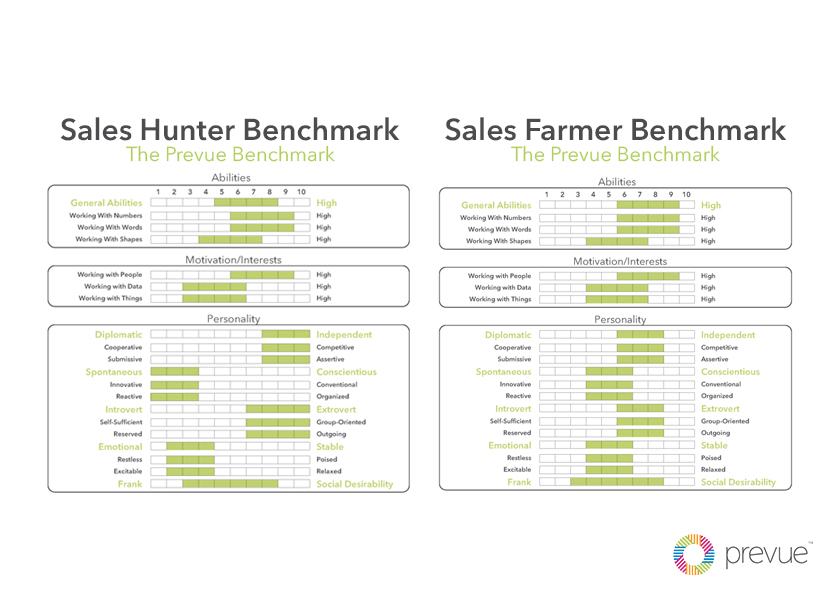Only Hiring the Most Talented Candidate for Every Sales Role

It can be difficult to find truly resilient, talented salespeople in today’s workforce. And, when a bad fit is hired, it costs a company a great deal of time, money, and progress.
For one, a mis-hire drains energy from an entire office. Not only will he or she eventually quit or be fired, but the process of training them will exhaust colleagues and leaders. People that don’t
have the same workplace aptitude as the rest of the staff take the whole team backwards. In fact, hiring the wrong individual has twice the negative impact that hiring a great fit does for
success.
This is especially true in sales, where the environment quickly exposes who will and won’t last. Employees who can’t handle intense competition or a fast-paced environment will eventually
burn-out. Similarly, those that lack the ability to read clients will find themselves constantly questioning where they went wrong.
There are a number of attributes commonly associated with an ideal salesperson; however, these traits are not suitable for all sales roles. In fact, different types of sales roles call for inherently
different types of people. While this logic seems simple, the difference between these individuals may pass undetected in an interview or on a resume. In fact, most salespeople will appear fairly similar in an interview. As a result, it is nearly impossible to select an ideal hire based on this process alone.
Identifying the Sales Hunter
Although sales roles call for similar types of people, there are crucial differences in what each position requires. Sales hunters, for example, are responsible for acquiring new leads. As such,
they must be extremely outgoing and opportunistic; they mustn’t require constant support or supervision from colleagues. Moreover, they need to be extremely resilient. This role involves
rejection, and that can’t deter them from moving ahead.
Indeed, many individuals feel drained in a high-stress environment; however, a sales hunter excels at this fast-pace and feels energized by competition. Although they love working with
people, they are also extremely independent and assertive. As a result, they artfully communicate their pitch and gain trust during the sales process, quickly closing the sale. Their
delivery seems genuine, rather than forced. They also appear highly competent, which instills greater trust.
Identifying the Sales Farmer
A sales farmer, on the other hand, doesn’t have such extreme personality traits. While they share some commonalities with hunters, they are ultimately quite different people. Moreover,
they simply won’t flourish in a fast-paced environment in the way a sales hunter will. Rather than accruing new leads, a sales farmer nurtures and cultivates relationships with existing clients. Of
course, they can still generate new sales; however, their strength lies in the ability to maintain important client relationships.
Like hunters, farmers are people oriented. And, while they are also independent and assertive, they are much less so than hunters. Similarly, they are less spontaneous and outgoing, but still
possess these traits. Ultimately, farmers have far less extreme personalities. They are ambitious and highly intelligent, but much less reactive and emotional. As such, they won’t take as many
risks, and prefer to spend more time with clients. With that being said, they excellent listeners, and extremely detail-oriented. Therefore, they are excellent account managers, and create longstanding, profitable relationships with clients.
Assessment Benchmark
It may be nearly impossible to identify a sales hunter or farmer in an interview, but pre-employment testing with Prevue allows employers to do so with confidence. And, in order to build a strong
sales team, companies must ensure that they select the ideal person for each position. Performing an assessment benchmark indicates exactly how much potential a candidate has for
a given role.
For instance, a sales hunter will have a very clear personality profile. Easily identified with a lightning bolt, their assessment conveys very strong personality traits. In essence, there won’t
be a grey area with these hires. If a candidate doesn’t have these strong traits, they will quickly burn-out. In order to reduce employee turnover, employers need to acquire extremely
independent, assertive hunters that enthusiastically bring in business.From here, employers require sales farmers that will develop and maintain these new clients. A farmer’s personality assessment will appear like a less exaggerated lightning bolt. Indeed, the difference between these personalities is so subtle, that an interviewer would likely consider them the same; however, the Prevue Farmer Benchmark provides a clear illustration of exactly what differentiates this personality.